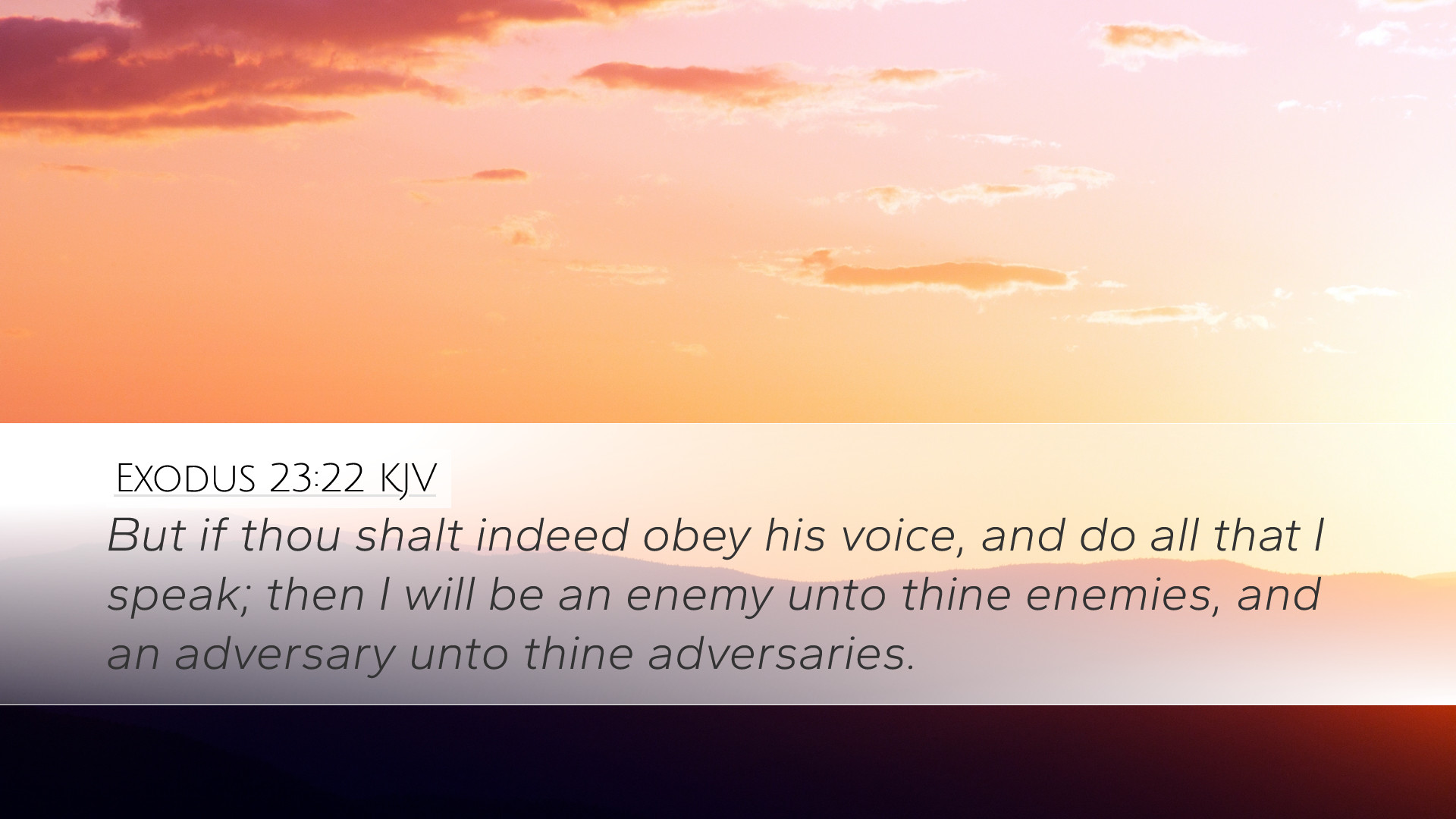Commentary on Exodus 23:22
Verse: "But if thou shalt indeed obey his voice, and do all that I speak; then I will be an enemy unto thine enemies, and an adversary unto thine adversaries."
Introduction
This verse presents a significant promise from God to His people, rooted in the obedience of His commands. A joint examination of this passage using insights from public domain commentaries reveals profound theological truths and practical applications that resonate with pastors, students, and scholars alike.
Theological Context
Exodus 23:22 finds its place within God’s covenant with Israel. This covenant stipulates blessings contingent upon obedience. The stipulation set forth in this verse highlights the condition of obedience as key to receiving God’s intervention in their struggles against enemies.
Matthew Henry's Commentary
Matthew Henry emphasizes the personal relationship between God and His people. He notes that obedience is a dual act—listening to God's voice and adhering to His commands. Henry observes that this verse encapsulates the essential principle of divine protection for those who faithfully follow God.
- Obedience as a Condition: Henry points out that God's protective promise is predicated on the people's willingness to obey. This reflects a foundational principle of the covenant relationship.
- Divine Advocacy: Where God pledges to be an enemy to Israel's enemies, Henry articulates that divine assistance is assured for the faithful. This creates a sense of assurance that God fights on behalf of His people.
Albert Barnes' Notes
Albert Barnes adds further insight by detailing the implications of obedience to God's directives. He interprets the phrase, “I will be an enemy unto thine enemies,” as indicative of God’s active involvement in Israel's affairs.
- God’s Vow: Barnes elucidates that God is committed to acting in the interests of His people. The promise extends beyond mere words; it is an active promise meant to combat any opposition.
- The Assurance of Victory: Barnes argues that this divine promise serves to embolden believers, reminding them that God’s might is greater than any human adversary they may face.
Adam Clarke's Commentary
Adam Clarke offers a more nuanced view of this verse, emphasizing the nature of God's voice as an imperative call to action. Clarke discusses the importance of discerning God’s communication among competing voices.
- Active Listening: Clarke highlights the necessity of listening for God's voice and understanding His commands as a vital element of spiritual growth and success.
- Divine Relationship: He explains that the nature of the relationship with God hinges on this obedience and trust, asserting that it lays the groundwork for God to manifest His protective nature.
Practical Applications
For modern pastors, students, and theologians, Exodus 23:22 serves not only as historical context but also as a living text that invites reflection on contemporary obedience to God’s will.
- Scholarly Reflection: The importance of obedience in theological discourse should be emphasized. It pronouncedly affects the believer's understanding of God’s promises today.
- Pastoral Care: Pastors may derive comfort and teaching points from this verse in counseling situations, encouraging congregants to trust in God’s faithful protection as they navigate challenges.
- Theological Discourse: This text can foster discussions on the nature of God’s involvement in the struggles of believers, compelling debates on foreknowledge, free will, and the interplay of divine sovereignty and human action.
Conclusion
In summary, Exodus 23:22 encapsulates a vital truth about the relationship between divine obedience and protection. The insights from Matthew Henry, Albert Barnes, and Adam Clarke collectively deepen our understanding of God’s promises to His people, stressing the essential nature of obedience in the believer’s life. While God's assurance to protect and defend is profound, it fundamentally hinges on a cooperative relationship built on listening and fidelity to His voice.


